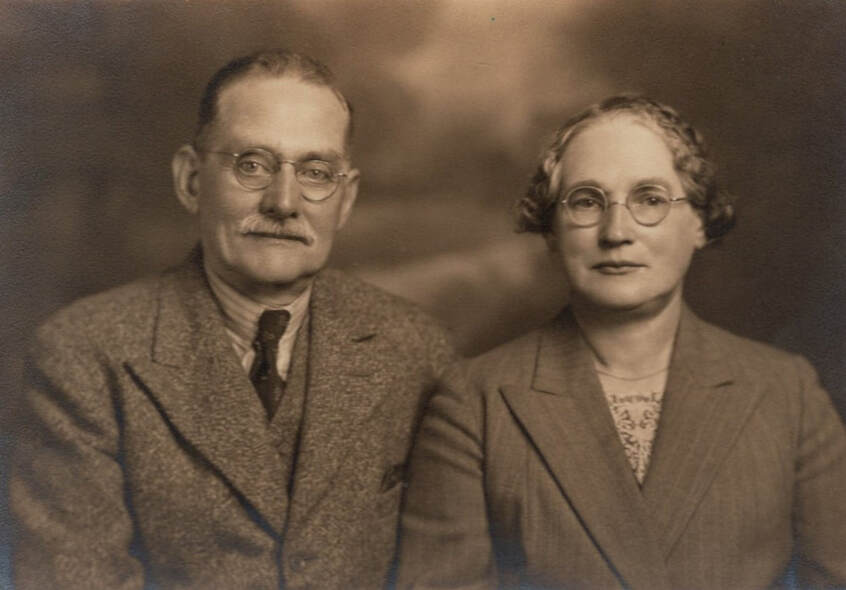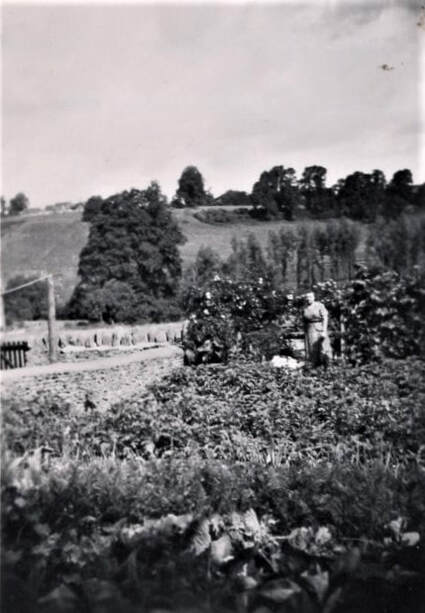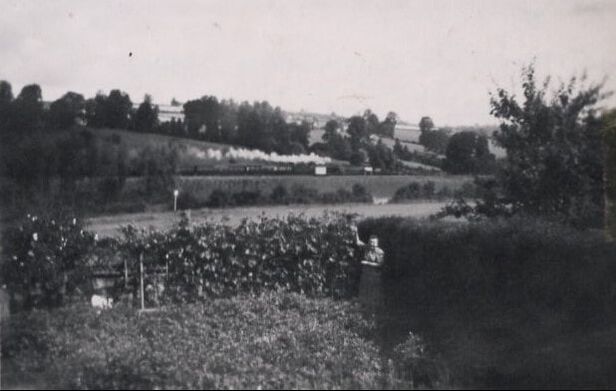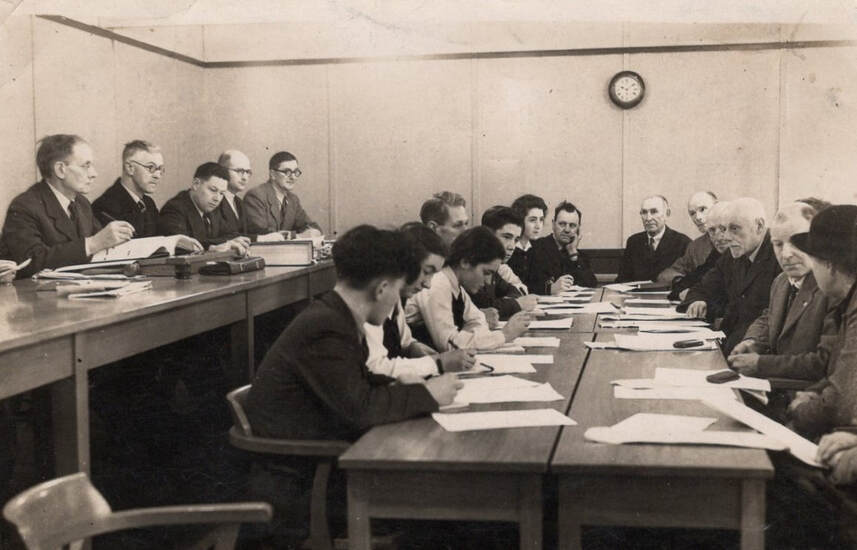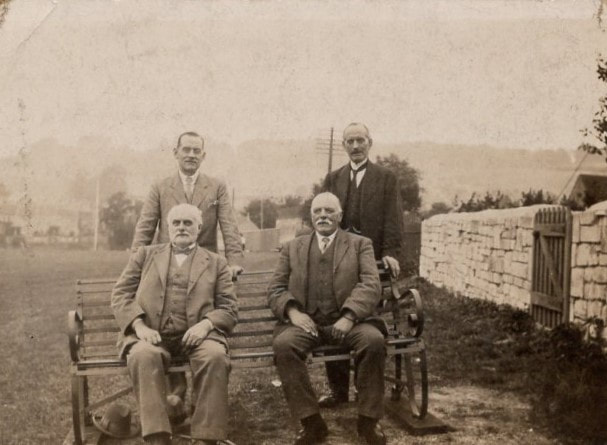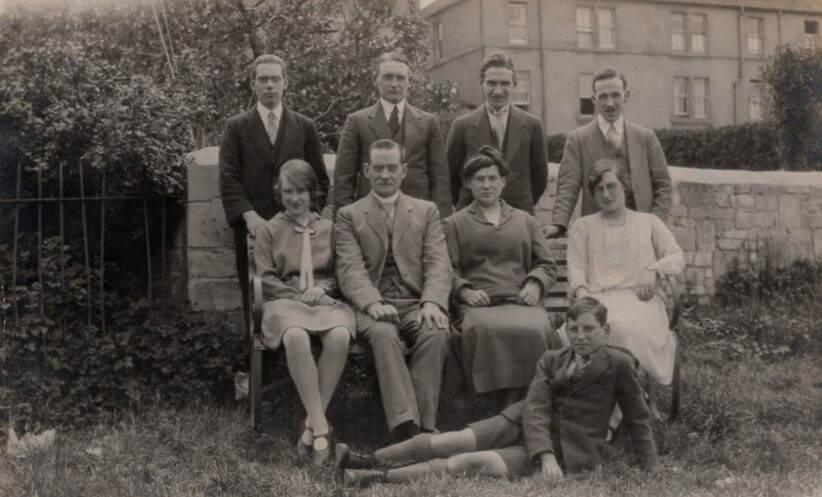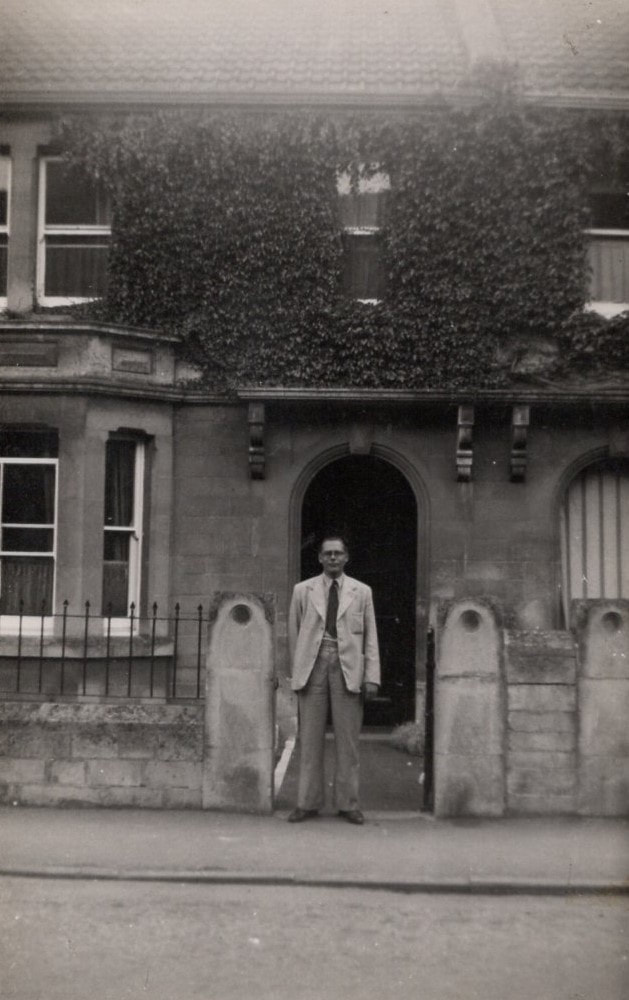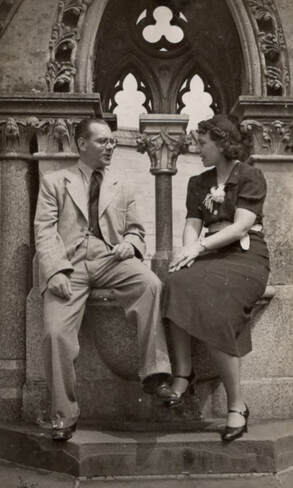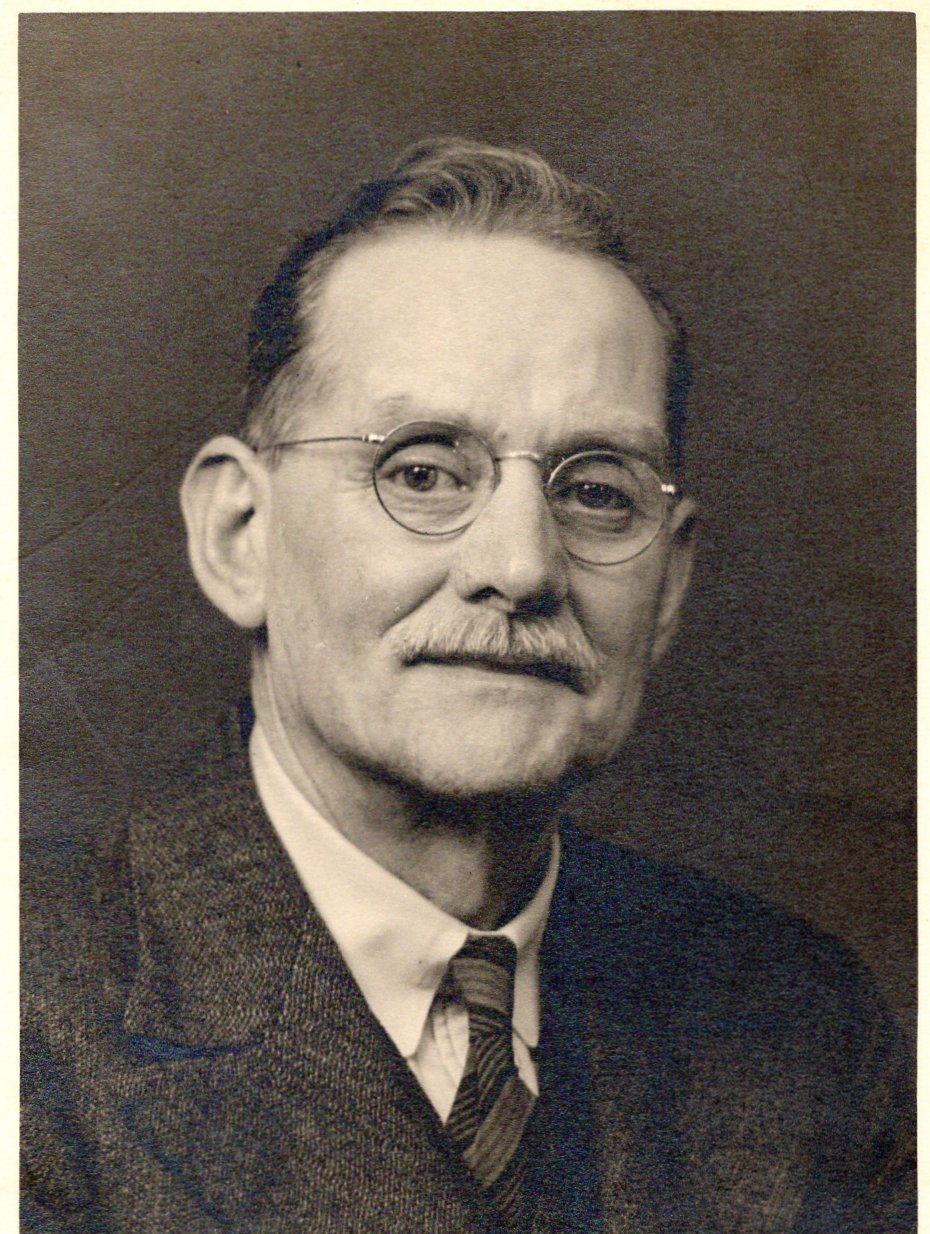John Brooke at 2 Mead Villas Text and Photos John Brooke Flashman, July 2021
In the last issue, John Flashman told the story of John and Virginia Brooke at Kingsdown. They were upright residents of Kingsdown, for 27 years running the bakery, a general store and the post office in the hamlet. They were staunch Baptists who attended the Methodist Church in Kingsdown as there was no local Baptist meeting place. Following medical advice, John retired from business and settled on life in the centre of Box village at 2 Mead Villas. It was the start of an entirely new career for him, which helped to shape the future of the Box Parish Council through his commitment to the residents of Box.
Life at 2 Mead Villas
When my grandfather lived at 2 Mead Villas he always got his meat supplies from Abraham's butchers shop which was located just along the road from him next to the Queen's Head pub, which had George's Bristol Beers emblazoned along its front. Also opposite 2 Mead Villas was Bradfield's newsagents run by Frank Bradfield who had a beard and I was informed that this was because he had suffered from tuberculosis and had a weak throat. His younger brother, Donald, was a journalist and wrote the centenary history of the Box Cricket Club.
At the rear of 2 Mead Villas was my grandfather's garden. He had a line of apple trees bordering the path down to the garden gate, and the garden itself was always full of vegetables. On the right hand side of the path was a hedge which served as the boundary between No 2 and No 1 (in my time occupied by Edward Vezey and his invalid sister Alice) and on the other side of the garden the properties were divided by a dry stone wall. Adjoining the kitchen at Mead Villas was a separate room, always known to us as the cat's parlour. I believe it was converted into a toilet after John's son Arthur had his leg amputated. There was another, outside toilet located halfway down the back garden path on the right. None of us liked using it as it was dark and not very pleasant.
When my grandfather lived at 2 Mead Villas he always got his meat supplies from Abraham's butchers shop which was located just along the road from him next to the Queen's Head pub, which had George's Bristol Beers emblazoned along its front. Also opposite 2 Mead Villas was Bradfield's newsagents run by Frank Bradfield who had a beard and I was informed that this was because he had suffered from tuberculosis and had a weak throat. His younger brother, Donald, was a journalist and wrote the centenary history of the Box Cricket Club.
At the rear of 2 Mead Villas was my grandfather's garden. He had a line of apple trees bordering the path down to the garden gate, and the garden itself was always full of vegetables. On the right hand side of the path was a hedge which served as the boundary between No 2 and No 1 (in my time occupied by Edward Vezey and his invalid sister Alice) and on the other side of the garden the properties were divided by a dry stone wall. Adjoining the kitchen at Mead Villas was a separate room, always known to us as the cat's parlour. I believe it was converted into a toilet after John's son Arthur had his leg amputated. There was another, outside toilet located halfway down the back garden path on the right. None of us liked using it as it was dark and not very pleasant.
Above Left: John inspecting the runner beans in his vegetable garden at 2 Mead Villas and
Right: Gladys Brooke standing in front of the runner bean towers, and the stone wall dividing the property from No 3 Mead Villas
Right: Gladys Brooke standing in front of the runner bean towers, and the stone wall dividing the property from No 3 Mead Villas
At the end of the Sunday evening service at the Methodist Chapel in Box (at which attendance for us was compulsory) there was always a group of fellow worshippers who came back to 2 Mead Villas. We sat with them in the front room whilst they discussed events of the day. The chat tended always to be of a somewhat morbid nature. On one occasion the discussion centred on a young clergyman who was currently in hospital with some malady which needless to say was described in detail. One of the assembled company then came forward with the information that she had visited him in hospital. She was asked to describe his condition. Everyone leaned forward in anticipation of her response. They were not disappointed: Well she said, He looked like...like...like a little old man. At this, a sigh of satisfaction rang round the room. I used to dislike those evening gatherings for several reasons: firstly, they went on for ages; secondly, I had to keep perfectly quiet and not fidget; and, thirdly, the chairs were upright and very uncomfortable, and the seat coverings were rough and prickly, the more so because I wore short trousers in those days.
Inside 2 Mead Villas there may still be a relic of my grandfather's carpentry skills. From the front door a passage leads along to the kitchen and on the right, just before the step down to the kitchen, is a cupboard. In the early years of the war there was a warning issued over the radio to the effect that, if Germany invaded, food supplies would be severely limited and households were advised to find a secure place in which items could be stored. With this in mind my grandfather built a secret cupboard within the cupboard and stored various items as suggested.
Inside 2 Mead Villas there may still be a relic of my grandfather's carpentry skills. From the front door a passage leads along to the kitchen and on the right, just before the step down to the kitchen, is a cupboard. In the early years of the war there was a warning issued over the radio to the effect that, if Germany invaded, food supplies would be severely limited and households were advised to find a secure place in which items could be stored. With this in mind my grandfather built a secret cupboard within the cupboard and stored various items as suggested.
Above Left: Gladys Brooke by the hedge separating the garden from the Vezeys next door. In the background is a steam train heading towards Box Tunnel.
Above Right: View of The Rec from 2 Mead Villas showing the steps leading up to Box Mill Lane Halt
Above Right: View of The Rec from 2 Mead Villas showing the steps leading up to Box Mill Lane Halt
New Career
Following advice from his doctor to the effect that if he wished to extend his life rather than die from overwork within the next two years, John and Virginia left Kingsdown and took up residence in 2 Mead Villas. A lesser man might have decided to take things easy after such a devastating medical prognosis, but John was made of sterner stuff and still had a firm sense of public duty and an obligation to give assistance to the community. He was a member of Box Parish Council from 1913 until 1944 and from 1924 until 1944 a member of the local Rural District Council (RDC). After moving to Box, he continued in both these posts and in 1934 he became chairman of the newly-created Calne and Chippenham RDC, and chairman of Wiltshire branch of the National Executive of RDC Associations. These positions also carried with them membership of the Chippenham bench of magistrates.
Following advice from his doctor to the effect that if he wished to extend his life rather than die from overwork within the next two years, John and Virginia left Kingsdown and took up residence in 2 Mead Villas. A lesser man might have decided to take things easy after such a devastating medical prognosis, but John was made of sterner stuff and still had a firm sense of public duty and an obligation to give assistance to the community. He was a member of Box Parish Council from 1913 until 1944 and from 1924 until 1944 a member of the local Rural District Council (RDC). After moving to Box, he continued in both these posts and in 1934 he became chairman of the newly-created Calne and Chippenham RDC, and chairman of Wiltshire branch of the National Executive of RDC Associations. These positions also carried with them membership of the Chippenham bench of magistrates.
Work as Parish Councillor
These years were some of the most troubled times in local government with mass unemployment, a polarisation of public political views and the increasing threat of a second world war. His commitment was such that he missed only two meetings of the District Council. His service as a magistrate included work on the Joint Isolation Hospital Board (trying to restrict the spread of tuberculosis), on the Appeal Board for National Service, and as a manager of the new Box Highlands School.
Writing from 2 Mead Villas during the depths of the unemployment in Box in 1932, he lent his support to the Bath Gas Company who were installing the mains gas pipe from the centre of the village to Chippenham.[1] Instead of using mechanical excavators, the company agreed to revert entirely to hand labour, despite the additional cost incurred. As far as is possible unemployed men from the places through which the main is being laid are being engaged on the work, most of it unskilled labour. John praised their public-spirited action ... providing employment for sixty extra men for three months ... Honour to whom honour is due; hats off the Bath Gas Company.
John was very proud of the fact that, after he became Chairman of the RDC, he was re-elected unopposed for the rest of his time on the Council. He did a lot for the inhabitants of Box and on one occasion he took himself off to London to see the housing minister. On arrival at Whitehall, he was told that the minister was too busy to see him, whereupon he told the minister's private secretary that he was going to stay in the waiting room until the minister had finished whatever it was that he was doing. He won the day in that, when the minister did finally emerge, he was taken to task by John, who made his point very forcibly.
These years were some of the most troubled times in local government with mass unemployment, a polarisation of public political views and the increasing threat of a second world war. His commitment was such that he missed only two meetings of the District Council. His service as a magistrate included work on the Joint Isolation Hospital Board (trying to restrict the spread of tuberculosis), on the Appeal Board for National Service, and as a manager of the new Box Highlands School.
Writing from 2 Mead Villas during the depths of the unemployment in Box in 1932, he lent his support to the Bath Gas Company who were installing the mains gas pipe from the centre of the village to Chippenham.[1] Instead of using mechanical excavators, the company agreed to revert entirely to hand labour, despite the additional cost incurred. As far as is possible unemployed men from the places through which the main is being laid are being engaged on the work, most of it unskilled labour. John praised their public-spirited action ... providing employment for sixty extra men for three months ... Honour to whom honour is due; hats off the Bath Gas Company.
John was very proud of the fact that, after he became Chairman of the RDC, he was re-elected unopposed for the rest of his time on the Council. He did a lot for the inhabitants of Box and on one occasion he took himself off to London to see the housing minister. On arrival at Whitehall, he was told that the minister was too busy to see him, whereupon he told the minister's private secretary that he was going to stay in the waiting room until the minister had finished whatever it was that he was doing. He won the day in that, when the minister did finally emerge, he was taken to task by John, who made his point very forcibly.
Council Disputes
When he resigned in November 1944, it was ostensibly because of Virginia's ill-health but we might imagine that he was worn out by village issues throughout the war period.[2] In August 1940 there was the problem of the Air Raid Siren which sounded in the centre of the village whenever busloads of workmen were travelling from Bath and Bristol to the underground quarry works. The village was split between disruption and safety and 600 people who attended a meeting were not slow in in indicating their feeling.[3] Eventually it was sorted. The same year, John lent his efforts to establishing a dump for scrap metal (iron, steel, brass, and copper) at the main entrance of the Recreation Field. He requested articles of aluminium urgently needed for aircraft production should be deposited at his house.[4] In the event, Churchill’s idea for using the metal was never implemented and the whole collection was dumped in the sea off Spithead after the war ended. I remember that 2 Mead Villas had iron railings and a gate along its front, painted in a dull pink. After the railings were taken away, my grandfather constructed and installed a wooden fence and a gate to replace them.
There was an even more difficult problem in 1943 involving the great benefactor of the village, George Jardine Kidston. The concept of a civil authority to administer local decision-making came with the Local Authority Act of 1894. It was a deliberate attempt to democratise local controls and to reduce the power of the lord of the manor. However, a new type of individual had evolved in Box, with the influence and money to be able to affect local settlements. Mr GJ Kidston of Hazelbury Manor had an enormous influence on the village, almost all of it beneficial. He had set in train the preservation of the history of the village though the Hazelbury Pageant of 1925 and in the same year an arrangement whereby the Recreation Field was bought for the benefit of the village to become the Village Rec.
Notwithstanding all that the village owed to Mr Kidston, the relationship between him and the council brought the parties into conflict in 1943 when Mr Kidston requested an alteration of the footpaths at Hazelbury Manor to divert them away from the front of the manor house.[5] The dispute put John in an unenviable position between the wishes of villagers and the public benefactor Mr Kidston. A year later John took the decision to bring his public service to an end.
When he resigned in November 1944, it was ostensibly because of Virginia's ill-health but we might imagine that he was worn out by village issues throughout the war period.[2] In August 1940 there was the problem of the Air Raid Siren which sounded in the centre of the village whenever busloads of workmen were travelling from Bath and Bristol to the underground quarry works. The village was split between disruption and safety and 600 people who attended a meeting were not slow in in indicating their feeling.[3] Eventually it was sorted. The same year, John lent his efforts to establishing a dump for scrap metal (iron, steel, brass, and copper) at the main entrance of the Recreation Field. He requested articles of aluminium urgently needed for aircraft production should be deposited at his house.[4] In the event, Churchill’s idea for using the metal was never implemented and the whole collection was dumped in the sea off Spithead after the war ended. I remember that 2 Mead Villas had iron railings and a gate along its front, painted in a dull pink. After the railings were taken away, my grandfather constructed and installed a wooden fence and a gate to replace them.
There was an even more difficult problem in 1943 involving the great benefactor of the village, George Jardine Kidston. The concept of a civil authority to administer local decision-making came with the Local Authority Act of 1894. It was a deliberate attempt to democratise local controls and to reduce the power of the lord of the manor. However, a new type of individual had evolved in Box, with the influence and money to be able to affect local settlements. Mr GJ Kidston of Hazelbury Manor had an enormous influence on the village, almost all of it beneficial. He had set in train the preservation of the history of the village though the Hazelbury Pageant of 1925 and in the same year an arrangement whereby the Recreation Field was bought for the benefit of the village to become the Village Rec.
Notwithstanding all that the village owed to Mr Kidston, the relationship between him and the council brought the parties into conflict in 1943 when Mr Kidston requested an alteration of the footpaths at Hazelbury Manor to divert them away from the front of the manor house.[5] The dispute put John in an unenviable position between the wishes of villagers and the public benefactor Mr Kidston. A year later John took the decision to bring his public service to an end.
Generosity
John was regarded as the most prosperous member of the Brooke family but he was noted for his generosity and also his honesty and integrity. He strongly believed in putting money into bricks and mortar and acquired a number of properties in Box over the years. In the early 1930s the tenant of one of the properties asked him how much it would cost to purchase the house. John quoted a price and told him to let him know when he had the money. Years later, the man said he was in a position to make an offer on the house based on its current value. When John told him that he could have the property for the original asking price, the tenant said that would make it ridiculously undervalued. John’s response was, My word is my bond.
During the years of depression in the early 1930s, John volunteered to organise the Box Schools annual sports and raise sponsorship for prizes. Typical of the man, he donated all the prizes when no one else came forward.[6]
In 1939 John and Virginia were supporting Emma Grant Fry, John’s sister, who had been suddenly widowed when she was only 41 in 1906. Emma suffered a severe mental breakdown and attempted to take her own life. On her release from a mental institution, she tried to settle in Canada and USA but eventually returned to England. In 1939 she was living with John and Virginia at 2 Mead Villas, described as a 74-year-old widow who was incapacitated. She died on 14 March 1940 at the Aged Pilgrim's Home, Islington, London.
John was regarded as the most prosperous member of the Brooke family but he was noted for his generosity and also his honesty and integrity. He strongly believed in putting money into bricks and mortar and acquired a number of properties in Box over the years. In the early 1930s the tenant of one of the properties asked him how much it would cost to purchase the house. John quoted a price and told him to let him know when he had the money. Years later, the man said he was in a position to make an offer on the house based on its current value. When John told him that he could have the property for the original asking price, the tenant said that would make it ridiculously undervalued. John’s response was, My word is my bond.
During the years of depression in the early 1930s, John volunteered to organise the Box Schools annual sports and raise sponsorship for prizes. Typical of the man, he donated all the prizes when no one else came forward.[6]
In 1939 John and Virginia were supporting Emma Grant Fry, John’s sister, who had been suddenly widowed when she was only 41 in 1906. Emma suffered a severe mental breakdown and attempted to take her own life. On her release from a mental institution, she tried to settle in Canada and USA but eventually returned to England. In 1939 she was living with John and Virginia at 2 Mead Villas, described as a 74-year-old widow who was incapacitated. She died on 14 March 1940 at the Aged Pilgrim's Home, Islington, London.
|
Strict Disciplinarian
I have very happy memories of holidays spent at 2 Mead Villas although my grandfather maintained a very strict routine which sometimes put a bit of a damper on our activities. In those days there was a railway station (Box Mill Lane Halt) at the bottom of the recreation field behind 2 Mead Villas. On Sunday mornings we would take the train from Mill Lane into Bath, to attend morning worship at the Manvers Street Baptist Church. We returned home by bus and by the time we got back to the house the dinner - invariably a casserole - was ready. The strange thing was that my grandfather always bought return tickets for the train journey because they were cheaper than singles! As I mentioned above, on Sunday evenings we always attended the service at Box Methodist Chapel. John’s rigid beliefs are demonstrated by his attitude to finding work for his fourth surviving child, Cecil Francis. Cecil’s first job after leaving school was with a printing works outside Bath. On learning that they printed labels to go on beer bottles, his strictly teetotal parents were horrified and removed him from the company’s employment forthwith. In 1919 Cecil started a five-year apprenticeship with Wessex Associated News Limited. Under the terms of this Cecil was forbidden to play cards, dice, tables or any unlawful game and was not to haunt taverns or ale-houses – I am sure his parents approved. Left: Cecil outside 2 Mead Villas. The original iron railings can be seen, and at that time Virginia Creeper adorned the upper storey wall, removed sometime after the war |
|
Cecil moved to London initially in the printing trade but later became involved in the motor industry, registering a company as The Royalty Garage, Brixton in 1934. The business operated two coaches, one of which Cecil would drive whilst his assistant drove the other. Early in 1935, the second coach failed to return to the depot and Cecil found the wreckage of the vehicle which had collided with a lamp-post, killing several passengers. As a result, Cecil’s business was in ruins and he told his father that he had no alternative but to declare himself bankrupt. His father’s response was typically straightforward and to the point: We’ve never yet had a bankruptcy in the family and we’re not going to have one now. How much do you need? John lent him £270 (today worth £20,000). Worse followed because in 1936, Cecil married his first cousin Gladys Violet Brooke. Nearly all the family strongly disapproved of the marriage but John’s attitude was: If you really love her, then marry her and damn the family. |
John & Virginia's Golden Wedding
My grandma Virginia was an organist, possibly at Box Methodist Church and definitely at the Primitve Methodist Church on Beech Road.[7] In those days the organ was pumped by a small boy and one one occasion when Grandma attempted to play the hymn there was no sound. She peeped into the curtained area where the boy was and found him fast asleep. Clearly the sermon which had just ended had proved too long and had fallen on deaf ears.
On 14 May 1944, John and Virginia celebrated their golden wedding, pictured in the headline photograph. As a boy of six, I well remember attending the family gathering to mark the occasion. Almost exactly a year later, Virginia died at 2 Mead Villas following a long and painful illness. In later years, my grandfather used to say that he had kept a diary for every day of his adult life except one. I feel sure that the missing day was that when Virginia died.
John received little formal education and his literacy was largely self-taught. But he was still capable of writing a beautifully composed letter without a single spelling error as this one to his son Cecil dated 21 December 1944:
Dear Cecil,
Many thanks for your kind letter of good wishes for Christmas, also your cheque for £30 in complete settlement of the account between us. Am especially glad to know that you are both now well, and sincerely trust that you may spend a pleasant Xmas. You may no doubt derive some amount of pleasure in making arrangements for the party. I am sorry to say that Ma has had another setback. She had been making a little improvement slowly for a few weeks, although not allowed out of doors, but another severe attack came on last Sat. night and I had to get the doctor in at midnight to give her and injection to put her to sleep. Since then, although not having another sharp attack, she is very weak, and has to stay in bed all the time. One trouble is that she is very forgetful and unless I am constantly on the watch she will get out of bed and out into the kitchen or upstairs to the bathroom which, of course, the doctor strictly forbids. One blessing is that she has a good appetite and as there is no restriction on her diet I can manage the food part of the business alright. I can only do what I can and hope for the best.
This winter has taken a severe toll of old people in the parish. Mrs J Tiley and Mrs T Hancock both 90 years old both died in the same week, and since then Mr Druett the schoolmaster, Mr Robson and George Hinton, all of whom you know, and several others besides. I am very thankful that I am keeping fit myself, and able to do all that is required of me, although of course I have had to give up several outside matters.
We send you both our kindest Christmas greetings and goodwill.
Your affectionate Dad.
My grandma Virginia was an organist, possibly at Box Methodist Church and definitely at the Primitve Methodist Church on Beech Road.[7] In those days the organ was pumped by a small boy and one one occasion when Grandma attempted to play the hymn there was no sound. She peeped into the curtained area where the boy was and found him fast asleep. Clearly the sermon which had just ended had proved too long and had fallen on deaf ears.
On 14 May 1944, John and Virginia celebrated their golden wedding, pictured in the headline photograph. As a boy of six, I well remember attending the family gathering to mark the occasion. Almost exactly a year later, Virginia died at 2 Mead Villas following a long and painful illness. In later years, my grandfather used to say that he had kept a diary for every day of his adult life except one. I feel sure that the missing day was that when Virginia died.
John received little formal education and his literacy was largely self-taught. But he was still capable of writing a beautifully composed letter without a single spelling error as this one to his son Cecil dated 21 December 1944:
Dear Cecil,
Many thanks for your kind letter of good wishes for Christmas, also your cheque for £30 in complete settlement of the account between us. Am especially glad to know that you are both now well, and sincerely trust that you may spend a pleasant Xmas. You may no doubt derive some amount of pleasure in making arrangements for the party. I am sorry to say that Ma has had another setback. She had been making a little improvement slowly for a few weeks, although not allowed out of doors, but another severe attack came on last Sat. night and I had to get the doctor in at midnight to give her and injection to put her to sleep. Since then, although not having another sharp attack, she is very weak, and has to stay in bed all the time. One trouble is that she is very forgetful and unless I am constantly on the watch she will get out of bed and out into the kitchen or upstairs to the bathroom which, of course, the doctor strictly forbids. One blessing is that she has a good appetite and as there is no restriction on her diet I can manage the food part of the business alright. I can only do what I can and hope for the best.
This winter has taken a severe toll of old people in the parish. Mrs J Tiley and Mrs T Hancock both 90 years old both died in the same week, and since then Mr Druett the schoolmaster, Mr Robson and George Hinton, all of whom you know, and several others besides. I am very thankful that I am keeping fit myself, and able to do all that is required of me, although of course I have had to give up several outside matters.
We send you both our kindest Christmas greetings and goodwill.
Your affectionate Dad.
As a small boy I met Mr Robson on several occasions, who my grandfather mentions in the letter and who lived in a bungalow in Ashley Lane. What I particularly remember about him is that he had a long white beard and that he and Mrs Robson were very good friends of my grandparents. When I was about six in 1944, Mr Druett gave us a tour around Box School and I am amazed that I can remember it clearly.
Later Life
Although he developed a degenerative and debilitating heart condition in his later years, this did not prevent John from leading an active life. As a small child I remember accompanying him and my parents on lengthy walks, usually in the heat of the summer sun. When my sister and I were very small he used to walk us along the road past the cemetery up to as far as the bridge at Shockerwick. It was very tiring for little legs, although not as tiring as the walk up to Colerne (and back). Of course, very few people had cars in those days. My mother was very strict on those walks and we children were not allowed to sit on the ground in order to have a rest. Another walk we used to undertake was up to the top of Middlehill Tunnel where we could look over the parapet and see Mead Villas and other residences. It seems it was always summer in those far-off days.
My uncle and aunt, Eric Henry (known as Dick) Brooke and Gladys Blent, had established themselves in Kidderminster during the war and later moved down to Ilfracombe, Devon, where Dick ran a jeweller and watchmaker business. By the early-1960s, they came back to the outskirts of Box. Now in his eighties, John was still living on his own at 2 Mead Villas. It became obvious that he could no longer look after himself and Dick immediately took on the task of caring for him, visiting every day, dressing and shaving him. Eventually the time came when despite Dick’s care he could no longer live on his own and his final months were lived out in St George’s Hospital, Semington, Wilts, where he was treated with the utmost kindness.
Later Life
Although he developed a degenerative and debilitating heart condition in his later years, this did not prevent John from leading an active life. As a small child I remember accompanying him and my parents on lengthy walks, usually in the heat of the summer sun. When my sister and I were very small he used to walk us along the road past the cemetery up to as far as the bridge at Shockerwick. It was very tiring for little legs, although not as tiring as the walk up to Colerne (and back). Of course, very few people had cars in those days. My mother was very strict on those walks and we children were not allowed to sit on the ground in order to have a rest. Another walk we used to undertake was up to the top of Middlehill Tunnel where we could look over the parapet and see Mead Villas and other residences. It seems it was always summer in those far-off days.
My uncle and aunt, Eric Henry (known as Dick) Brooke and Gladys Blent, had established themselves in Kidderminster during the war and later moved down to Ilfracombe, Devon, where Dick ran a jeweller and watchmaker business. By the early-1960s, they came back to the outskirts of Box. Now in his eighties, John was still living on his own at 2 Mead Villas. It became obvious that he could no longer look after himself and Dick immediately took on the task of caring for him, visiting every day, dressing and shaving him. Eventually the time came when despite Dick’s care he could no longer live on his own and his final months were lived out in St George’s Hospital, Semington, Wilts, where he was treated with the utmost kindness.
|
Recognition of his Work
Despite his high-profile work, John's reputation has diminished, partly because of the modesty of the man himself. In 1935 he was awarded the George V Jubilee medal for his public service.[8] It was amongst the local community that he was mostly known. Because of his eminence, he was a frequent representative at the funerals of local notables from Kingsdown and Box, including Mr Edwin Bow, the eminent Box Methodist, himself a preacher for over 50 years.[9] John commanded universal respect and was held in high regard by all who knew him. He was a man of the highest principles who demanded an immaculate standard of behaviour from his immediate family. I was once told that, of the family, only my uncle Cecil and my mother were not afraid of him. He maintained his links with the Baptist movement until the end but when he died in March 1963, three months short of his 90th birthday, he had outlived the vast majority of his contemporaries and his funeral at Box was attended by only a few close friends and relatives. It takes a rare person to give as much to his community as John Brooke of 2 Mead Villas, Box, one of the best-known and most highly respected men in the public life of Wiltshire.[10] |
References
[1] Bath Chronicle and Herald, 10 December 1932
[2] The Wiltshire Times, 11 November 1944
[3] Parish Magazine, August 1940
[4] Parish Magazine, August 1940
[5] The Wiltshire Times, 29 January 1944
[6] Parish Magazine, August 1930
[7] Wiltshire Times and Trowbridge Advertiser, 24 September 1932
[8] Bath Weekly Chronicle and Herald, 22 June 1935
[9] Bath Weekly Chronicle and Herald, 22 February 1941
[10] The Wiltshire Times, 20 May 1944
[1] Bath Chronicle and Herald, 10 December 1932
[2] The Wiltshire Times, 11 November 1944
[3] Parish Magazine, August 1940
[4] Parish Magazine, August 1940
[5] The Wiltshire Times, 29 January 1944
[6] Parish Magazine, August 1930
[7] Wiltshire Times and Trowbridge Advertiser, 24 September 1932
[8] Bath Weekly Chronicle and Herald, 22 June 1935
[9] Bath Weekly Chronicle and Herald, 22 February 1941
[10] The Wiltshire Times, 20 May 1944
